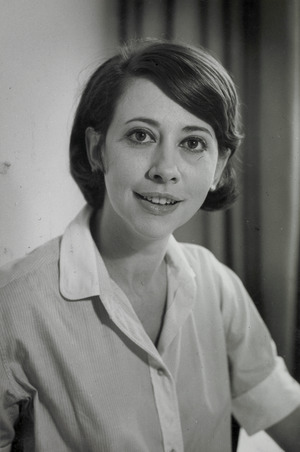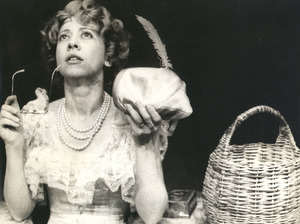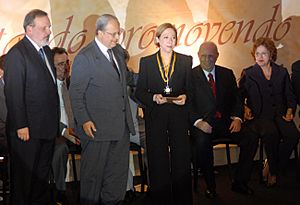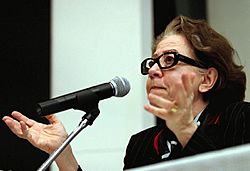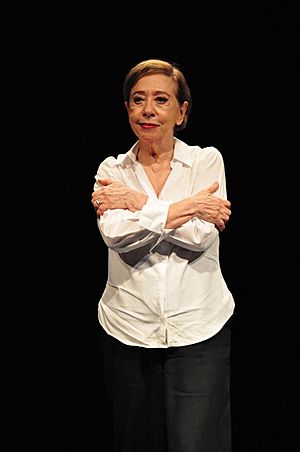Fernanda Montenegro facts for kids
Quick facts for kids
Fernanda Montenegro
ONM
|
|
|---|---|
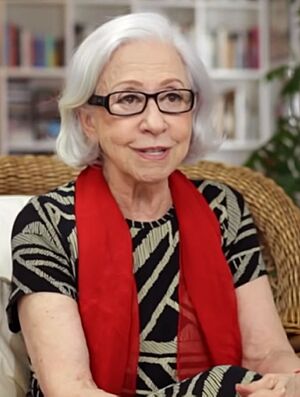
Montenegro in 2019
|
|
| Born |
Arlette Pinheiro Esteves da Silva
16 October 1929 Campinho, Rio de Janeiro, Brazil
|
| Education | Pedro II School |
| Alma mater | Berlitz Corporation |
| Occupation | Actress |
| Years active | 1950–present |
| Spouse(s) |
Fernando Torres
(m. 1953; died 2008) |
| Children | Cláudio Torres Fernanda Torres |
| Relatives | Andrucha Waddington (son in law) |
Fernanda Montenegro (born Arlette Pinheiro Esteves da Silva on October 16, 1929) is a famous Brazilian actress. Many people consider her the greatest Brazilian actress ever. She is often called the grande dame (a respected older woman) of Brazilian theater, movies, and performing arts.
Fernanda Montenegro made history with her role in the movie Central Station (1998). She became the first Brazilian and first Latin American actress to be nominated for an Academy Award for Best Actress. She was also the first actress nominated for an Academy Award for a role in a Portuguese language film. Her daughter, Fernanda Torres, was also nominated for an Academy Award in 2025. Fernanda Montenegro also won an Emmy Award for her performance in Sweet Mother (2014). She was the first Brazilian to win this award.
Over her career of more than sixty years, she has received many national and international awards. In 1999, she received Brazil's highest civilian honor, the National Order of Merit. This award recognized her amazing work in Brazilian performing arts. She has won the Molière Prize five times and the Governor Award of the State of São Paulo three times. She also won the Silver Bear for Best Actress at the 48th Berlin International Film Festival in 1998 for her role in Central Station. This role also earned her nominations for the Academy Award for Best Actress and the Golden Globe Award for Best Actress in a Motion Picture – Drama.
On television, Fernanda Montenegro was one of the first actresses hired by TV Tupi in 1951. She starred in many TV plays there. She started acting in telenovelas (Brazilian soap operas) in 1954 with A Muralha on RecordTV. She has worked for most of Brazil's main TV channels, including Band, TV Cultura, RecordTV, and TV Globo, where she has been since 1981.
In 2014, Forbes magazine named her the 15th most influential celebrity in Brazil. During the opening ceremony of the 2016 Summer Olympics, Fernanda read a famous poem. In November 2021, she was chosen to join the Brazilian Academy of Letters, a very important group of writers and scholars. In November 2024, she was recognized by Guinness World Records. She achieved the biggest audience for a Philosophy lecture, with over 15,000 people. This event took place on August 18, 2024, at Ibirapuera Park.
Contents
Early Life and Family
Fernanda Montenegro was born Arlette Pinheiro Esteves da Silva. Her father, Vitório Esteves da Silva, was a mechanic from Portugal. Her mother, Carmen Nieddu Pinheiro Esteves da Silva, was a housewife whose parents were Italians from the island of Sardinia.
Acting Career Highlights
Starting on Stage and TV
In the late 1940s, Fernanda Montenegro adapted famous plays for radio. She began her acting career in theater in 1950 with the play Alegres Canções nas Montanhas (Happy Songs on the Mountain). There, she met Fernando Torres, who later became her husband. She also worked with other famous actors like Sérgio Britto and Nathalia Timberg.
In 1951, she became a pioneer in Brazilian television. She worked for Rio de Janeiro's TV Tupi, which was the second TV station in South America. She appeared in many TV plays between 1951 and 1970.
In the early 1960s, Montenegro moved to São Paulo and focused mainly on theater. In 1963, she took her first role in a telenovela called Pouco Amor Não é Amor. She then appeared in other notable telenovelas. These included A Muralha (1968) and Sangue do Meu Sangue (1969).
During the 1970s, Montenegro spent less time on television. She focused more on her theater and film career. However, her TV performance in the classic play Medea in 1973 was highly praised. She returned to television more fully in the late 1970s with Cara a Cara (1979). For this role, she won the Best Actress in Television Award.
The 1980s marked Montenegro's strong return to television. She appeared in telenovelas like Baila Comigo (1981) and Brilhante (1982). She had a huge hit with Guerra dos Sexos (1983). This was a light comedy about arguments between men and women in relationships. In this show, Montenegro became famous for a food fight scene with Paulo Autran. She won two more Best Actress in Television Awards for her work in Brilhante and Guerra dos Sexos.
The early 1990s also brought success in television for Montenegro. She took on roles in two other popular telenovelas: Rainha da Sucata (1990) and O Dono do Mundo (1991). Both became favorites in Brazilian pop culture. Later, she appeared in the mini-series Incidente em Antares (1994). This show was based on a book by a great Brazilian writer, Érico Veríssimo.
In 1997, Montenegro's show Zazá did not meet expectations. It was supposed to be a big comedy hit but was not popular with critics or viewers. Despite changes, the show was cut short. However, this disappointment was soon forgotten due to the huge success of her film Central Station.
In the late 1990s and early 2000s, Montenegro's television career faced some challenges. In 2001, another comedy telenovela, As Filhas da Mãe, was also not successful. Despite this, Montenegro was nominated for a Best Actress award.
The next year, Montenegro took a smaller role in the telenovela Esperança (2002). While her performance received good reviews, the show itself was not popular. However, because of Montenegro's continued success in movies and her beloved status in Brazil, these setbacks were often seen as minor.
Montenegro returned to television success in 2005. She played a supporting role in the mini-series Hoje É Dia de Maria. This fantasy story was praised for its creativity and beautiful design. Montenegro was nominated for another Best Actress award.
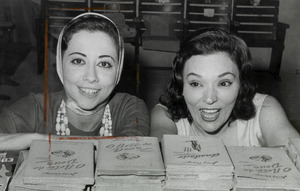
The following year, Montenegro starred in the primetime drama Belíssima (2006). She played the clever villainess, Bia Falcão. Critics and audiences loved her strong performance. For this role, Montenegro finally won her first Contigo Award for Best Actress. She also won her fourth Best Actress in Television Award.
In 2008, Montenegro played Dona Iraci in the mini-series Queridos Amigos. This show was based on a book by Maria Adelaide Amaral. It told a story about friends during a time of political change in Brazil.
In 2010, she starred in the telenovela Passione, playing Beth Gouveia. In 2012, Montenegro appeared in the mini-series As Brasileiras. She played an actress named Mary Torres who wanted to revive her career.
In Sweet Mother, she played Dona Picucha, an 85-year-old widow. Picucha faces life with humor and handles difficulties well. Fernanda said, "Picucha is 85 years old and still does not know what she wants to be when she grows up. I don't either." Montenegro won an Emmy Award for this role. She was the first Brazilian actress to win this award. She played the same character in the TV series of the same name in 2014. She was nominated for another Emmy in 2015, and the series won Best Comedy.
In 2013, at 85, Montenegro returned to television in the remake of Saramandaia. In the same year, she was in the telenovela Babilônia. She played Teresa, a lawyer in a relationship with Nathalia Timberg's character, Estela.
Film Career Achievements
Montenegro's film career began in the mid-1960s. Her first movie was A Falecida (The Deceased) in 1965. She won her first film acting award for this role.
Throughout the 1970s, she appeared in other movies. In 1978, she starred in Tudo Bem (Everything's Alright). This movie received good reviews and won the top prize at the Brasília Festival of Brazilian Cinema.
In 1981, Montenegro starred as Romana in Eles Não Usam Black-Tie (They Don't Wear Black Tie). This movie was a big hit in Brazil and gained international attention. It won major awards at film festivals worldwide, including the Grand Jury Special Prize at the Venice Film Festival.
During the 1980s, Montenegro focused more on television. However, she had a small role in A Hora da Estrela (Hour of the Star) in 1985. This movie was highly praised by critics both in Brazil and internationally. It won six awards at the Brasília Festival and three major awards at the Berlin Film Festival.
Montenegro returned to film in 1994 in a segment of Veja Esta Canção (Rio's Love Song). In 1997, she had a small role in O Que é Isso, Companheiro? (Four Days in September). This film starred American actor Alan Arkin and was about the kidnapping of an American consul in Brazil. The movie was nominated for a Golden Bear and an Academy Award for Best Foreign Language Film.
Central Station Success
In 1998, Montenegro starred in Central do Brasil (Central Station) as Dora. This became her most famous international role. The movie was very successful in Brazil. It won four awards from the São Paulo Association of Art Critics, including Best Film and Best Actress for Montenegro.
Central Station also received huge international praise. It won three major awards at the Berlin Film Festival: the Golden Berlin Bear for Best Film, a special prize, and the Silver Berlin Bear for Best Actress for Montenegro.
The film received many other honors. It won five awards at the Havana Film Festival, including Best Actress for Montenegro. It also won several awards for Best Foreign Film, including a BAFTA and a Golden Globe. It was nominated for a César Award, an Independent Spirit Award, and an Academy Award for Best Film in a Foreign Language.
Montenegro received many individual honors. She won Best Actress awards from the Fort Lauderdale International Film Festival, the National Board of Review, and the Los Angeles Film Critics Association. She was also nominated for a Golden Satellite Award, a Golden Globe, and the Academy Award for Best Actress in a Leading Role. This made her the first Brazilian and Latin American actress to receive such an honor from the Academy. She was also the first person nominated for a performance in the Portuguese language. In 2025, her daughter, Fernanda Torres, also received a Best Actress nomination for the movie I'm Still Here.
21st Century Films
After Central Station, Montenegro appeared in "Gêmeas" (1999). This film was directed by her son-in-law, Andrucha Waddington, and starred her daughter, Fernanda Torres. In 2000, the TV mini-series "O Auto da Compadecida," where Montenegro played the Holy Mary, was made into a film. It was very popular in Brazil.
In 2004, Montenegro's film career was very active. She returned to the Berlin Film Festival with O Outro Lado da Rua (The Other Side of the Street). This film received excellent reviews. Montenegro won the Horizons Award at the San Sebastian International Film Festival and the Best Actress Award at the Tribeca Film Festival. In Brazil, she won the Best Actress award for this film.
The same year, she had a supporting role in Redentor (Redeemer), directed by her son, Cláudio Torres. This movie was a big hit in Brazil. Also in 2004, Montenegro played Leocádia Prestes in the movie Olga. This film was based on a book about a Brazilian communist leader and a German socialist revolutionary. The movie did well at the box office and was chosen to represent Brazil in the Oscar race for Best Foreign Language Film.
In 2005, Montenegro took on three different lead roles in the film Casa de Areia (The House of Sand). She shared these roles with her daughter, Fernanda Torres. The movie was very successful in Brazil and received great reviews for Montenegro's performance. It also showed potential for international success.
In late 2006, Montenegro led a movement of film artists. They opposed a law that would reduce government support for cultural programs. On December 14, 2006, Montenegro spoke directly to the Brazilian Senate. She strongly criticized the law, saying, "Culture is, above all, a social need. It is not a frivolity." For her actions and career, Montenegro received an Honorary Award in 2007. Also in 2007, Montenegro played Tránsito Ariza in Love in the Time of Cholera. This was her first role in an English-language film.
In 2012, Montenegro starred in the short film A Dama do Estácio. In 2013, she was in the film Time and the Wind, based on a novel by Erico Verissimo.
In 2024, at 95 years old, Montenegro entered the Guinness World Record. She achieved the largest audience during a philosophical reading. She read from French writer Simone de Beauvoir's autobiography at Ibirapuera Park. Over 15,000 people attended.
Also in 2024, Montenegro and her daughter Fernanda Torres played Eunice Paiva at different ages in the acclaimed film I'm Still Here. This movie was directed by Walter Salles, who also directed Central Station. In 2025, this movie won the Academy Award for Best International Feature Film. It was the first Brazilian-produced film to win an Academy Award.
Personal Life
Fernanda Montenegro was married to Fernando Torres from 1954 until his death in 2008. They had two children: Fernanda Torres (born 1965), who won the Best Actress prize at the 1986 Cannes Film Festival and a Golden Globe Award in 2025, and film director Cláudio Torres (born 1962).
She chose her stage name "Fernanda" because she liked how it sounded. "Montenegro" was the last name of her family's doctor.
Filmography
Awards and Nominations
Honors
![]() – Grand Cross of the National Order of Merit: Awarded by President Fernando Henrique Cardoso on April 12, 1999.
– Grand Cross of the National Order of Merit: Awarded by President Fernando Henrique Cardoso on April 12, 1999.
Quotes
- "My English is not good. My soul is better."
- "I'm the Old Lady from Ipanema."
- "In Brazil, I have a career. In America, I have an accent."
- "Culture is, above all, a social need. It is not a frivolity."
Quotes
- "My English is not good. My soul is better".
- "I'm the Old Lady from Ipanema".
- "In Brazil, I have a career. In America, I have an accent."
- "Culture is, above all, a social need. It is not a frivolity."
- "I vote Lula in the hopes of a Brazil with education, with health, in the defense of nature. I vote Lula in the hopes of a real care for science, for culture, for the culture of the arts. In the name of democracy, for president, Lula." (10/07/2022)
See also
 In Spanish: Fernanda Montenegro para niños
In Spanish: Fernanda Montenegro para niños
 | Jewel Prestage |
 | Ella Baker |
 | Fannie Lou Hamer |


